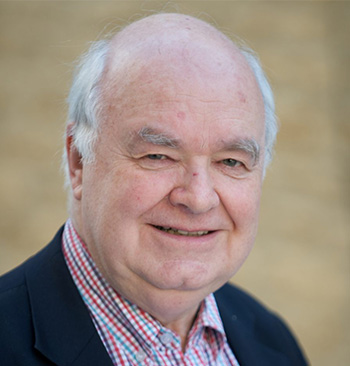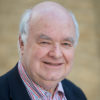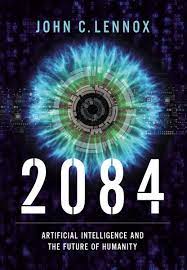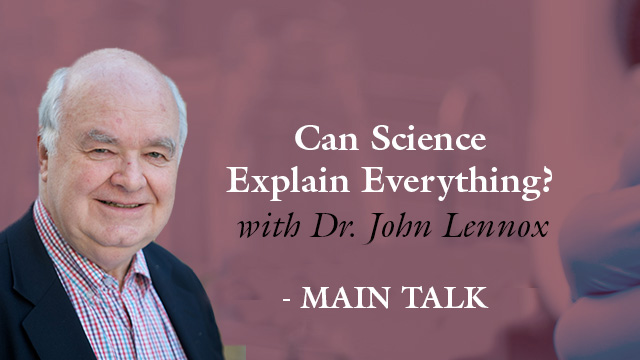Back to series


A Discussion with Dr. John Lennox
If you use a smartphone or voice assistant like Alexa or Siri, have gone through airport security or shopped online, then you have encountered Artificial Intelligence or A.I.
What is A.I. and what are the pros, cons, and ethical implications for us as this technology gains greater power and influence in our world? How is A.I. being used to control people groups in Communist countries through social credit schemes and manipulate those of us in Capitalist countries to purchase goods and services? What are the positive contributions of A.I. to human flourishing?
Dr. John Lennox responds to many of these questions and offers a clear understanding of what A.I. is, where it is heading, and thoughts on how followers of Jesus Christ can and should respond to both narrow A.I. and the more speculative, futuristic visions of A.G.I. that impact our view of God, humanity, and salvation itself.
Click here to learn more about Lennox's book, 2084: Artificial Intelligence and the Future of Humanity.
Resources to Accompany John Lennox's talk on Artificial Intelligence
Over the past 46 years we have developed many publications, discipleship resources, videos, and tools to help you to grow in your faith. We hope you will take the time to look through all of them. Because you were interested in this event we have pulled together the following resources that we believe will be of interest to you.
Science and technology have delivered so much to the world: clean water; more food; better healthcare; longer life. But can science explain everything? Is there still need for religion?
Oxford Mathematics Professor and Christian believer Prof. John Lennox offers a fresh way of thinking about science and Christianity that dispels the common misconceptions about both. He reveals that not only are they not opposed, but they can and must mix to give us a fuller understanding of the universe and the meaning of our existence.
Many people today are seeking to know who they really are, but they are going about it in the wrong way. Only Jesus Christ can help us discover and become who we are meant to be. In his conclusion to Mere Christianity, C.S. Lewis gives us the answer...
One of the important shifts among Christians has been the rise of the “emergent church.” A number of pastors, authors, and bloggers, such as Brian McLaren, Doug Pagitt, and many more, have written extensively about the shifts the church in the west is undergoing as we transition from the influences of the period called “modernity” to “postmodernity.”...
Many Christians recognize that we are living in a “culture of death,” where—especially in intellectual circles—there is easy acceptance of abortion and increasing support for physician-assisted suicide, infanticide, and euthanasia. While many Christians make cogent arguments against such practices—as they should—we seem to be losing ground...
On July 3, 1884, four English sailors on board a yacht, the Mignonette, encountered a terrible storm in the Atlantic Ocean. The yacht sank, leaving them stranded in a tiny wooden lifeboat. They had little food and no water. By their eighth day adrift, they were desperate and made the fateful decision to kill the cabin boy, who was already sick from drinking seawater...
Between 1947 and 1956, I was privileged to meet with C.S. Lewis in a group convened by Nicholas Zernov, Spalding Lecturer of Russian History at Oxford. I shared an apartment with Nicholas for seven years, and we entertained the group in our home together. After he published his novel, Till We Have Faces, I asked Lewis on one occasion, of all the books he had written, what did he consider the most important Christian message he had given? With no hesitation, his reply was, “the three lectures I gave at Newcastle on The Abolition of Man, in 1942-43, together with my recent novel, Till We Have Faces” (1956)...
“If you asked twenty good men today what they thought the highest of the virtues, nineteen of them would reply, Unselfishness. But if you had asked almost any of the great Christians of old, he would have replied, Love. You see what has happened? A negative term has been substituted for a positive, and this is of more than philological importance...
I expected a revolt. Instead, I got expressions of gratitude. I anticipated accusations of being a crotchety old man, but students told me they felt a sense of relief. I had just announced my decision no longer to allow computers or cell phones (or other tools of technology) in my classroom. I teach a course called Principles of Biblical Reasoning at a small Christian college, and I want our times together to be rich conversations about why we believe what we believe...
What is shaping you? The more we ponder this question, the more we will recognize how our choices in life are shaping us into the person we will ultimately become. “Sow a thought and reap a deed; sow a deed and reap an action; sow an action and reap a habit; sow a habit and reap a character; sow a character and reap a destiny.”1 In a very real sense, we make our choices, and then, for better or worse, our choices make us...

John Lennox
ProfessorDr. John C. Lennox is an Irish mathematician, bioethicist, and Christian apologist. Now retired, he is the Emeritus Professor of Mathematics at the University of Oxford as well as the Emeritus Fellow in Mathematics and Philosophy of Science at Green Templeton College, Oxford. He has also been a part of public debates with New Atheists such as Richard Dawkins, presenting intellectual defenses of Christianity. Lennox has written acclaimed books such as Cosmic Chemistry: Do God and Science Mix?, 2084: Artificial Intelligence and the Future of Humanity, and most recently A Good Return: Biblical Principles for Work<, Wealth and Wisdom. He received his Ph.D. of Philosophy at the University of Cambridge, while also holding numerous honorary degrees from other British universities.

 COPYRIGHT: This publication is published by C.S. Lewis Institute; 8001 Braddock Road, Suite 301; Springfield, VA 22151. Portions of the publication may be reproduced for noncommercial, local church or ministry use without prior permission. Electronic copies of the PDF files may be duplicated and transmitted via e-mail for personal and church use. Articles may not be modified without prior written permission of the Institute. For questions, contact the Institute: 703.914.5602 or email us.
COPYRIGHT: This publication is published by C.S. Lewis Institute; 8001 Braddock Road, Suite 301; Springfield, VA 22151. Portions of the publication may be reproduced for noncommercial, local church or ministry use without prior permission. Electronic copies of the PDF files may be duplicated and transmitted via e-mail for personal and church use. Articles may not be modified without prior written permission of the Institute. For questions, contact the Institute: 703.914.5602 or email us.
Categories
Speakers

John Lennox
Professor
Team Members

John Lennox
ProfessorDr. John C. Lennox is an Irish mathematician, bioethicist, and Christian apologist. Now retired, he is the Emeritus Professor of Mathematics at the University of Oxford as well as the Emeritus Fellow in Mathematics and Philosophy of Science at Green Templeton College, Oxford. He has also been a part of public debates with New Atheists such as Richard Dawkins, presenting intellectual defenses of Christianity. Lennox has written acclaimed books such as Cosmic Chemistry: Do God and Science Mix?, 2084: Artificial Intelligence and the Future of Humanity, and most recently A Good Return: Biblical Principles for Work<, Wealth and Wisdom. He received his Ph.D. of Philosophy at the University of Cambridge, while also holding numerous honorary degrees from other British universities.










